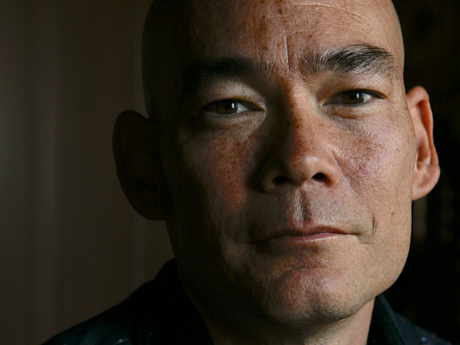Award Winners
Alice Fay Di Castagnola Award - 2020
Atsuro Riley
Finalists
Chloe Honum
Andrew Seguin

Oak
We were all of us empty of its heft and Tammy could tell.
•
Being she herself was ( wildling ) ( loosestrife-weed )
( undaddied ) same as us.
•
Flung chaff-motes that we were
she saw to tell us time and time that yonder oak its bark and bulk.
•
She harped on it; she rendered. Instilled-
elucidated treeness piece by part.
•
Have I said yet ( howsoever she’d’ve told us ) it was never it to her but him.
•
As in I school myself I climb the bluff I followfeel the roots of him. They river-
bound They gnarlin’ up from mud [ black pluff! ] He veins the bank.
•
Some say. Word was.
—That her ( fleetblooded ) actual daddy jacked the toll-thru ( humps the trains ).
•
She dwelled on it; she brooded. Elaborated-
fleshed for us especially much his arms.
•
How one mossy brawn-span she favored
had been scathed ( engraved along its length ) by lightning.
•
How the long-muscled ( strict, striated ) river-hanging-over one would hold.
•
You could loop a rope there Nearabout the bicep
Whap you up a wide horsehead knot to grip. To ride good Rid fear Let’s
not feature no blackflow flowin’ down below.
•
Cling strong till your hands numb till your blood goes.
Swing low. You could bellow you could holler while you’re at it ( Bending with you
not to break ) You could set yourself swayin’ till kingdom come Till he hears you till
•
he weighs you. You could ring rightful like the tongue of a bell.
Originally published in The Threepenny Review. Reprinted with the permission of the poet.
Julie Carr on Atsuro Riley
Formally innovative and musically dynamic, Atsuro Riley’s poems caught my eye and ear immediately. You know when you’re in the presence of something great when your first impulse is to look away, to save it for later, to set it carefully to the side for when you are ready. From the first line of “Call”—“It starts with the lamp that lamped our night our dirt”—we’re going somewhere, into a landscape charged with the bright light of discernment, where emotions are stirred by rhythmic torsion and sonic density. “The story-man encircling us binding us by lard-torch and ditty.”
All this pleasure in sound, rhythm, and form, however, wouldn’t be enough if not for the very real-world substance of these poems. There’s a tactile place here, and a real “we.” The poems’ vocabularies are rooted in the local: “bottle-frags” and “crud-oysters”; a “boy they call Tynan”; “Highway 52.” It doesn’t matter if I can recognize these places, people, or things—what matters is that the writer knows them deeply. The landscape (whether mythical, historical, or present-day) is concrete, specific, and carries its own music. I’m drawn in; I want to hear all of this; get lost in it and find language-ways I did not before know.
